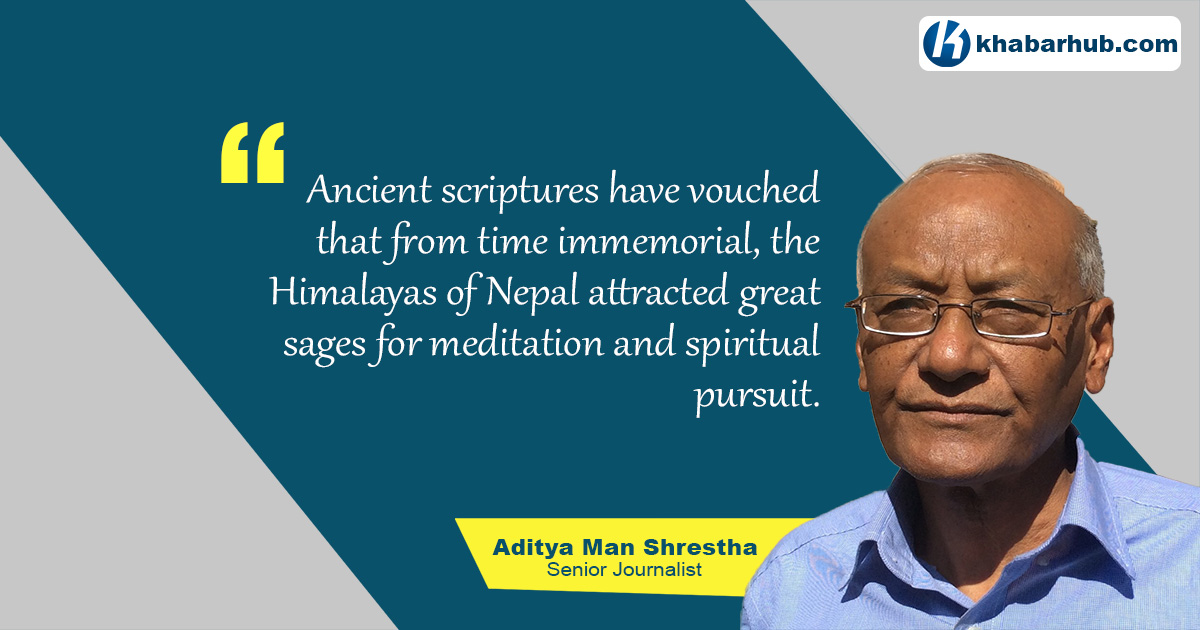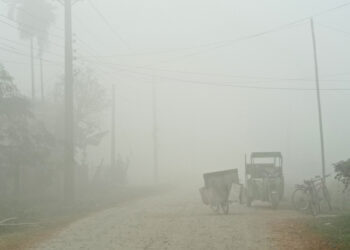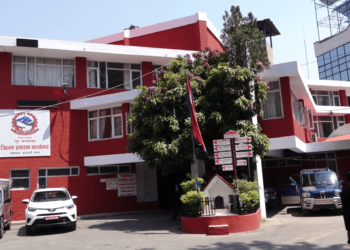Wise and learned people throughout the epoch of history have pondered about a meaningful life. Nepal, as dictated by the macroeconomic indices, is poor. However, Nepal was a treasure house of ancient wisdom for leading a liberated life through yoga and Ayurveda.
Every age sets a vision for its progress. The nomadic era perhaps thought of its emancipation in the form of settlement. The settlement gave birth to agricultural age that probably conceived of an industrial epoch. The evolution of human imagination eventually entered into an age of information and technology aided by internet connection across the globe.
We should also understand that we need, at least to maintain and enhance if possible, our capacity to grapple with the environment we are born so as to enjoy the life that everybody aspires to.
The world has, of late, come to a level of a village such that one can communicate, visualize and interact with other people as if meeting in person. The world has changed so much in scale from a physically limited territory of a village into a global village with a wide horizon. Since the villagers have no choice but to acclimatize to the new situation, a question arises how best they can do it.
Before addressing this question, we need to bear in mind that human beings have not undergone a change in terms of their physiology and brain structure. We should also understand that we need, at least to maintain and enhance if possible, our capacity to grapple with the environment we are born so as to enjoy the life that everybody aspires to.
I would better call it a vision for personal liberation because human beings are entangled in the chains of confusion, biases, traditions, and misconceptions. The vision that I visualize, can help man to conserve his physical strength, maintain mental peace and view the kaleidoscopic world in a holistic way. There are three fundamental things that must be followed to achieve happiness in life, a common feature of humankind irrespective of the age and the country he belongs to.
These are such valuable things which money cannot buy. They are good health, a peaceful mind, and spiritual awareness. Once upon a time, these were probably the most naturally endowed to mankind but in today’s context, they need to be acquired and achieved. In this life, one needs to strive for one’s liberation.
If possible, we should go a step forward in the pursuit of the liberation of the nation itself. There are more than 200 independent countries but most of them do not feel liberated in many respects. How to make them feel liberated in the real sense of the term could invite debates and sharp divisions. But there are certain basic needs to be fulfilled, basic duties of the state to be met, and basic conditions essential to enable the people to lead a decent life.
There is yet an incredible task of liberating God in our times because we find all gods confined in their specified abodes. Can we think of Allah visiting a church, Lord Krishna seated in a mosque, Jesus Christ worshiped in a temple, or Prophet Mohammad invited to a synagogue? If they cannot do so, are they not technically incarcerated in the virtual prisons of different seats of worship?
And have testimonies conflicts driven by faith resulting in untold human plight. We can think of a vision of reconciling the Gods so that they could co-exist in peace and leave their followers equally in peace. This is something being pursued for many centuries and worth pursuing in many more to come. Those who have a will and capacity to join should come forward.
The ancient yogis in Nepal and other parts of the Himalayas treated the physical existence as a means to serve the ultimate end of spiritual attainment of eternal peace and liberation. They approached human life with a holistic view of achieving what we consider today as a healthy body, peaceful mind, and spiritual awareness.
Ancient scriptures have vouched that from time immemorial, the Himalayas of Nepal attracted great sages for meditation and spiritual pursuit. It is, therefore, considered the fountain of knowledge and wisdom. However, the primary need for the early seekers was to build up a healthy body and immunity with high resistance power to take on the hardship of nature and unforeseen illness. They learned it by keen observation and insight into animal behavior.
Animals have no doctors. They live as per the natural laws. Man is not different from its metabolic system. The science of yoga emerged from intimate interactions among the human seekers, the animal world and natural environment. As a result, we find many of the yoga postures named after various animals, birds and natural products. The same phenomenon is ascribed to the process of development of Tai-qi in China, which is still in wide practice for maintaining a healthy body and mind.
The ancient yogis in Nepal and other parts of the Himalayas treated the physical existence as a means to serve the ultimate end of spiritual attainment of eternal peace and liberation. They approached human life with a holistic view of achieving what we consider today as a healthy body, peaceful mind, and spiritual awareness.
We find all phenomena of food, drink, relaxation, bath, exercise, meditation, contemplation, thinking process, chanting, community sharing of ideas and experiences interlinked for the happiness and liberation of man. The modern world has definitely been attracted to the physical wellness of yoga practice. However, it has yet to derive the optimum benefits from the holistic yogic approach to life.
Dr. Kashiraj Upadhyaya, who founded the Arogya Ashram of Nepal in 1972, was a great advocate of yoga and naturopathy. He believed Nepal to be the pivot of yoga science. He stated that the survival of the living species took place during the mythological deluge in Nepal’s premises at a time when it was under water.
So was the nectar produced in this region when the sea was churned out by the divine and devil forces? In this process, poison was also produced, which Lord Shiva is said to have consumed to save the world from destruction. The Himalayan coolness helped Him to relieve its burning effect.
Dr. Upadhyaya has also claimed that Dhanawantari, the founder of the Ayurvedic medicine was born in Nepal. Nepal has still a national network of Ayurvedic clinics that had acted as the sole source of treatment. It was only after the visit of Rana Prime Minister Jung Bahadur in 1905 to Britain that the allopathic medicine was introduced with an adverse impact on the native natural therapy. However, the importance of yoga, naturopathy, Ayurveda had continued at the grassroots level until the opening of Nepal to the outside world in 1950.
About a hundred years ago, Pahalman Singh Swar translated the Patanjali Yogasutra into the Nepali language for the benefit of common people. Similarly, Narendranath Rimal is credited for writing books in Nepali on yoga, and naturopathy. Yoganath Gautam was renowned for his knowledge in this field in the western part of Nepal. Nepal is still contributing to the wellness of mankind by this means.
Mr. Shrestha is a Senior Journalist.
(Views expressed in this article are the author’s own and do not necessarily reflect Khabarhub’s editorial stance)









Comment